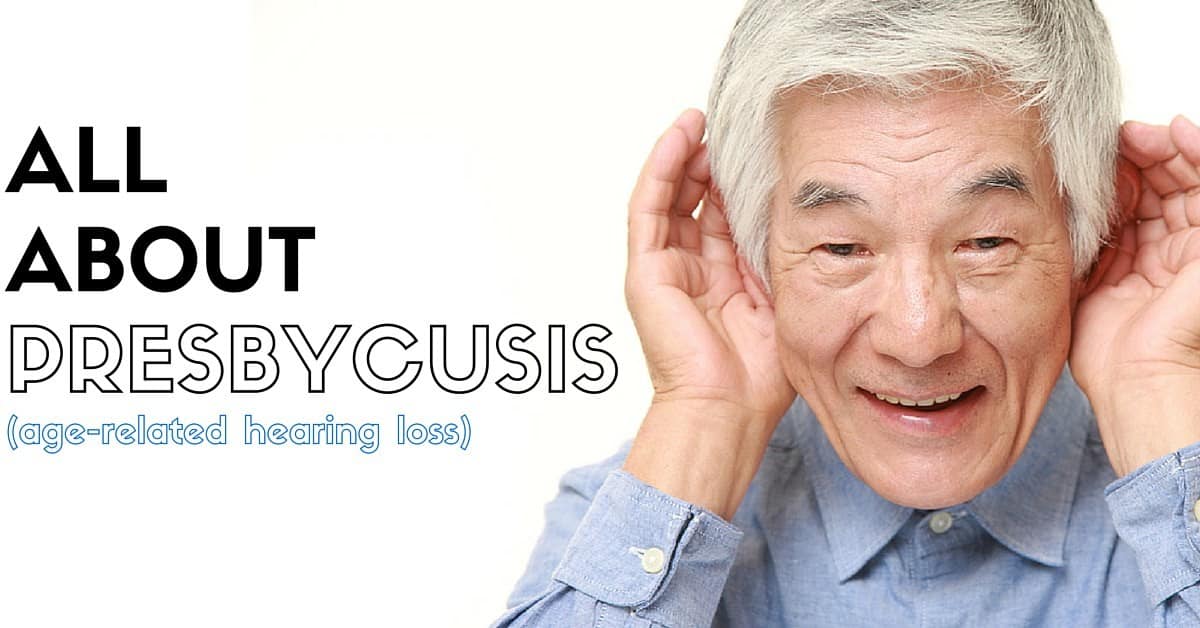All About Presbycusis (Age-Related Hearing Loss)
Presbycusis: General Facts
Age-related hearing loss (presbycusis) is the gradual loss of hearing that occurs in most of us as we age. It is a very common disorder, with one in three adults over age 65 and about half of people over age 75 reporting some degree of hearing loss. This condition usually occurs gradually, and most commonly in both ears equally. Many people will not notice the change immediately, and may not seek treatment until communication with others has become significantly impaired. In the United States, nearly half of those over the age of 75 have difficulty hearing external sounds such as phones and doorbells, and have difficulty talking with family and friends. When hearing loss becomes this severe, it can negatively impact daily life and lead to feelings of depression and isolation. Luckily, many effective treatments are available for the hard of hearing.
What are the causes of age-related hearing loss?
There may be many causes for presbycusis, and it can be difficult to distinguish between hearing loss that occurs as a natural result of age, and loss that is caused by the cumulative effects of exposure to loud noises. Most commonly, presbycusis occurs because of age-related changes within the inner ear, middle ear, or along nerve pathways to the brain. Contributing factors include the cumulative effects of environmental noises, the loss of hair cells (or sensory receptors) in the inner ear, and hereditary factors. Certain health conditions such as heart disease or diabetes, as well as the use of some ototoxic medications (medications which are toxic to the ear) such as aspirin, can exacerbate hearing damage.
What are the symptoms of age-related hearing loss?
The hearing loss that comes with increasing age can cause a variety of frustrating symptoms for those experiencing it. It may become difficult to follow conversations, especially in noisy environments, and others may always seem to mumble or not speak clearly. High-pitched sounds in particular may become harder to distinguish, and men’s voices may seem easier to understand than women’s. Misunderstandings and the necessity of asking others to repeat themselves may become increasingly common. Tinnitus, a bothersome buzzing or ringing sound in one or both ears, is another symptom that commonly accompanies hearing loss. Cumulatively over time, these symptoms can lead to stress, anxiety and fatigue if left untreated.
What are the available treatments?
If you think you have age-related hearing loss, the first step towards treatment is to seek the advice of your healthcare provider. You will most likely be referred to an audiologist for specialized tests to determine the degree of your hearing loss and the best possible treatment for your specific case. Most patients with age-related hearing loss see a significant improvement in their quality of life after being fitted with a hearing aid that is appropriate to their needs. Your treatment, and the type of aid your hearing care specialist helps you to choose, will depend on the severity of your hearing loss and your unique hearing needs, and as such you may need to try a few different models before finding the one that works best for you. Assistive listening devices, such as cell phone and telephone amplification devices, may also be useful. With the ever-increasing number of hearing care technologies on the market, there is no reason to let this bothersome condition go untreated.


